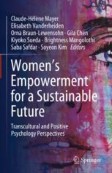Search
Search Results
-
Offline dominance and zeugmatic similarity normings of variably ambiguous words assessed against a neural language model (BERT)
For any research program examining how ambiguous words are processed in broader linguistic contexts, a first step is to establish factors relating to...

-
Toward Greater Clarity in Defining and Understanding Nonattachment
Nonattachment is a key positive element of several psychotherapeutic approaches, including mindfulness-based interventions. However, it has been...
-
Women Struggling and Thriving in Higher Education: Exploring the Experiences of Women Researchers Through Social Dream Drawing
Globally, role expectations, competency requirements and increased workload challenge academics’ wellbeing. Women researchers in the academia face...
-
Dimensions of the ‘Body’ in Tranquility Meditation
A perusal of selected forms of early Buddhist tranquility meditation brings to light the complexity of the roles assumed by the Indic term kāya ,...
-
Effects of Mindful Practices on Terror of Mortality: A Randomized Controlled Trial
ObjectivesEarly Buddhist thought clearly recognizes the need for learning how to face one’s own mortality, for which purpose mindfulness practice has...

-
From Oppression to Love as Mother Earth Joins the Time’s Up and #MeToo Movements
This chapter starts by examining the existing parallels between the oppression of women and the unbridled domination of the ecosystem. This chapter...
-
Making, Unmaking, and Discovering Buddhahood: Three Paradigms of the Relationship Between Meditation and Ethics
This article maps out three broad approaches to understanding the relationship between ethical behavior and meditation in examples of classical...
-
Reaktionen auf Tod und Sterben: Individuum, Familie und Gesellschaft
Nach einem Todesfall können Trauerreaktionen auf persönlicher, familiärer und gesellschaftlicher Ebene auftreten. Der Tod ist ein Stressfaktor und...
-
Verstorbenen-fokussierte Trauer bei komplizierter/langwieriger Trauerstörung
Im Gegensatz zur normalen Trauer ist die komplizierte/langanhaltende Trauerstörung beständig. Der Trauernde sehnt sich ununterbrochen nach dem...
-
Investigating the relationships of free will belief, presence of meaning in life, and self-consciousness with authenticity: a mixed-methods study
Authenticity refers to personality and situational characteristics that enhance the psychological well-being of individuals. Authenticity develops...

-
Human Suffering
Human suffering is a universal experience, unique to each individual. Its alleviation is the aim of practitioners, yet literature is sparse and...
-
Mortality, Mortuaries, and Movement - Implications of Dance/Movement Therapy and Death: A Literature Review
Dance/movement therapy (DMT) is a somatic-based psychotherapy approach that can supplement existing therapy techniques or stand on its own as...
-
Expanding the Self Behind Closed Doors: Exploring the Role of the Lockdown in Self-Realization Among Young Adults
Self-realization or the path which involves the elaborate process of knowing oneself leads people to a meaningful and fulfilling life. The present...
-
Verstorbenen-fokussierter Ansatz: Ein alternatives Trauermodell
Aktuelle Modelle und Theorien der Trauer konzentrieren sich auf die Trauernden bei der Trauerbewältigung. Aus den folgenden Gründen schlägt das...
-
Do extroverts choose happy entertainments and neurotics, sad entertainments? A test of the trait-consistent affect regulation hypothesis
The trait-consistent, affect regulation hypothesis states that people regulate their affect so that it is consistent with their traits. Thus...
-
The Management Mantra of the Bhagavad Gita: Key to Organizational Excellence
The paper aims to understand and expand the idea of ardent devotees of the Hindu Dharma who devoutly follow the Bhagavad Gita, inarguably the epitome...
-
The Significance of Freud’s Cultural Theory for the Theory and Practice of Psychoanalysis
The Freudian cultural theoretical writings are examined for the cultural psychological basic model of the relationships between people contained...
-
Relevant Concepts from Motivational Psychology
Various ways of categorizing motivation and behavior have been proposed. In the instrumental or behaviorism view espoused by Skinner, behavior is...
-

-

